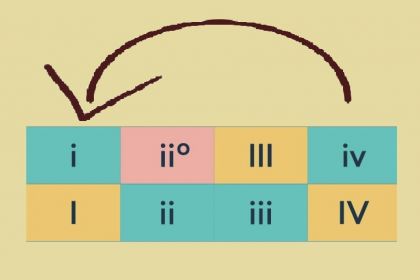Music Theory
Dorian mode in The Doors songs

The Doors' LA Woman The Workshop Sessions CD cover
The Dorian minor mode is a part of the diatonic system that canonizes the usage of the seven heptatonic scales in Western classical and popular music. According to this system, it's possible to compose pieces in either polyphonic or homophonic form, the latter of which is designed to provide a harmonious interaction between the melodic line and chord accompaniment. The harmonic structure of the Dorian scale is detailed in our article covering 5 songs featuring Dorian mode.
One way or another, the Dorian mode appears only in six songs released by The Doors. Their musical output cannot be considered classically oriented since only a third of their 59 tracks—written for their six studio albums when the band was helmed by Jim Morrison—follows the tonal theory. These 21 songs are mostly composed in the Ionian and Aeolian modes which generally dominate Western music while relegating the rest of the diatonic scales to a modal status. The band also composed a number of songs in the Mixolydian and Lydian major modes but never used the Phrygian minor mode.
A clear example of the Dorian mode with some deviations into the Ionian major scale is seen in When the Music's Over. In the harmonic analysis of the song's chord chains, the scale degrees (denoted with Roman numerals) show the following progression in E Dorian:
- Em–A or i–IV;
- D–Em or VII–i;
- D–Em–B or VII–i–V.
Throughout the track, Morrison's trans-like narration is accompanied by the Em–A true Dorian riff built on a simple alternation of two triads rooted in the first and fourth scale degrees. These elements form the IV–i musical turnaround known as the plagal cadence.
The harmony is refreshed by the D–Em chord progression that appears on the thrice-repeated phrases "turn out the lights" and "until the end" at the end of some verses. This sequence is reinforced by the B dominant chord that forms the half-authentic cadence. This tool is heavily used in classical music to close musical phrases and sections. Note that the B major triad rooted in the fifth scale degree does not belong to the Dorian mode—in which this chord is a minor one—and appears here precisely to present the stanza final in a more distinct way.
A curious example of the tonicization of the fourth scale degree appears in the sequence accompanying the lyrics "for(when) the music is your special friend, dance on fire as it intends, music is your only friend". It is used in the track twice as A–E7–A–E7–D or I–V7–I–V7–IV. Here the tonal center is shifted to A Ionian which then morphs into the above-mentioned Dorian sequence to match the lyric "until the end".
Listen to When the Music's Over (2017 Remaster) by The Doors:
Another worthy example of the Dorian mode appears in Peace Frog mainly performed with the following chord progression in G Dorian: Gm–C–B♭ or i–IV–III.
There is a short deviation into G Lydian mode seen in the progression: Em–G–F♯m–A or vi–I–vii–II which matches the lyrics "she came, then she drove away, sunlight in her hair". This chord chain is a typical example of the so-called harmonic sequence where a certain musical turnaround is repeated in a modified form involving different scale degrees. Here the segment of the sequence is formed by two chords vi–I whose roots are spaced from each other by the musical interval of a minor third. This segment is repeated at the seventh (vii–II) degree of the Lydian diatonic scale.
Listen to Peace Frog (2020 Remaster) by The Doors:
The Spy is the only the Doors song composed entirely in the Dorian mode without any deviation as shown by the following chord progressions in E Dorian:
- Em–A–Em–G–D–Em or i–IV–i–III–VII–i for the verses;
- D–Em or VII–i for the "I know everything" section.
In addition to the Em minor tonic chord, all three major chords built in the third, fourth, and seventh degrees of the Dorian diatonic scale also make an appearance.
Listen to The Spy by The Doors:
Technically, two more The Doors tracks can be attributed to both the Dorian and Aeolian modes as they are accompanied by a simple riff composed of the tonic and subtonic chords. Their structure is identical in both modes:
- Em–D or i–VII for Break On Through;
- Am–G or i–VII for Five to One.
Finally, the Dorian mode indirectly manifests in Maggie M'Gill as the borrowed D major chord built on the fourth scale degree. The song is written in A Aeolian with the following chord chain observed in the verses: Am–Dm–Am–C–D–Am or i–iv–i–III–IV–i.
In the progression, the borrowed Dorian subdominant chord precedes the final tonic triad, thus refreshing the ending portion of the verse.
Listen to Maggie M'Gill by The Doors:
Explore how The Doors uses other musical modes:
- Mixolydian mode in The Doors songs
- The Doors songs with Aeolian and harmonic minor modes
- Peace Frog: the only Doors song featuring Lydian mode
Discover more songs composed in Dorian minor mode and check out their harmonic analysis in the following articles:
- 5 songs featuring Dorian mode
- Beatles songs with Dorian mode
- No Quarter: two minor modal modes of Led Zeppelin's psychedelic track
- Knights of Cydonia: Dorian-mode refrain boosting best Muse song
- El Farsante and 7 more songs by Ozuna in Dorian and Aeolian modes



